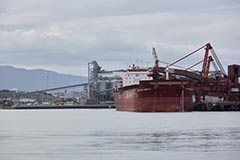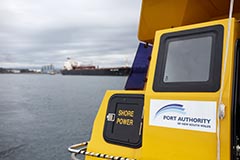Good corporate governance creates and sustains an ethical and legal environment which recognises the interests of all stakeholders in a Corporation. The Board of Port Authority is responsible for overall corporate governance of the Corporation and has adopted corporate governance practices and procedures that are appropriate to manage Port Authority in the best interests of the Voting Shareholders and other stakeholders.
Port Authority complies with each of the recommendations in the NSW Treasury Guidelines for Governing Boards of Government Businesses and this corporate governance section outlines Port Authority of New South Wales’ governance practices.
The Board is responsible for overseeing the business and commercial affairs of Port Authority of New South Wales including:
- approving business and financial strategy
- approving business and financial objectives
- monitoring business and financial performance
- reviewing performance and remuneration of executive management
- reviewing the risk management and internal control framework
- recommending to the Portfolio Minister the appointment and removal of the Chief Executive Officer
- reviewing any reporting to Voting Shareholders.
The Chief Executive Officer is responsible for the day to day management of the operation of Port Authority of New South Wales in accordance with the general policies and specific directions of the Board. It is the responsibility of the Board to oversee the activities of management in carrying out these delegated duties.
The Board’s role and responsibilities to each key stakeholder are set out in the Port Authority of New South Wales’ Board Charter.
Port Authority of New South Wales’ Code of Conduct outlines the general business ethics and acceptable standards of professional behaviour expected of all directors, employees and contractors.
The Code covers personal and professional behaviour, fraud and corruption responsibilities, including policies on accepting gifts and benefits, ethics and conflicts of interest requirements. Employees are encouraged to report any suspected breaches and, if they do so, will be protected as detailed in Port Authority’s Protected Disclosures Policy.
The Code of Conduct is available to all employees on Port Authority’s intranet. It works alongside other more detailed policies including the Fraud and Corruption Policy, Disciplinary Policy and Internal Reporting Policy.
Any significant breaches of the Code of Conduct must be reported immediately to the Chair.
To assist the Board in discharging its functions and to allow a more detailed analysis of the specialised areas of finance, risk, audit, remuneration, human resources and governance, the following committees have been established:
- Audit and Risk Committee
- People and Culture Committee
- Nominations Committee
Each Committee has a clear Charter setting out the Committee’s roles, responsibilities and delegated authority from the Board. The Charter of the Board and all Board Committee Charters are reviewed on a regular basis and updated to remain relevant to the Corporation.
The Chairman of the Audit and Risk Committee is Matthew Irwin. Matthew is an independent non-executive Director. Other members of the Committee are David Marchant and Kirsten Molloy, who are each independent, non-executive Directors.
Each member of the Committee is financially literate and has knowledge of the business. Matthew Irwin has qualifications and experience in accounting. The Board considers the mix of skills and experience on the Audit and Risk Committee appropriate to meet the responsibilities of its charter.
The Committee is responsible for oversight and review of:
- financial control and reporting
- risk management
- debt structure and debt instruments
- accounting policies
- internal controls
- compliance with taxation and other applicable laws and regulations
- integrity and performance of the internal audit function, including appointing the Internal Auditor
- external auditor’s audits, management letter and management’s responses.
Please refer to the Audit and Risk Committee Charter.
The Chair of the People and Culture Committee is Zorana Bull. Zorana is an independent non-executive Director, who is not the Chair of the Board. The other members of the Committee are David Marchant, Kirsten Molloy and Andrew Scipione, who are also an independent, non-executive Directors.
Following the expiry of previous Directors’ terms on 31 December 2019, no new Director appointments have been made to date. The Committee does not currently have the required level of membership to operate and the duties of the Committee are being undertaken by the full Board at this time.
The People and Culture Committee is responsible for assisting the Board in fulfilling its corporate governance responsibilities in regard to:
- overall remuneration strategy and remuneration policies for the Chief Executive Officer and Executive Management
- performance of the Chief Executive Officer and Executive Management
- employment terms and conditions of the Chief Executive Officer and Executive Management
- human resource (HR) management practices including succession planning, , talent development and employee engagement
- diversity and culture programs
- workplace relations and industrial relations issues.
Please refer to the People and Culture Committee Charter.
The Chair of the Nominations Committee is David Marchant. David is an independent non-executive Director. The other members of the Committee are Zorana Bull and Matthew Irwin who are also independent non-executive Directors.
The Committee meets on an as-required basis and is responsible for assisting the Port Authority Board in fulfilling its corporate governance responsibilities with regard to Board composition.
This includes assessing the necessary and desirable skills and experience of Directors, ensuring Directors have the appropriate mix of competencies, identifying skills and experience to fill those gaps, and overseeing the induction and continuing education of Directors.
Please refer to the Nominations Committee Charter.
Under the State Owned Corporations Act (NSW) 1989 the Port Authority Board is required to have a minimum of three and a maximum of seven Directors. The Voting Shareholders appoint the Chair, who is currently Robert Dunn. Robert was is an independent Director and his role is clearly separated from the role of the Chief Executive Officer, Philip Holliday. Robert was appointed as Chair of the Port Authority Board effective 1 August 2018. He was previously a Director of the Port Authority and was a Director of Sydney Ports Corporation and Port Kembla Port Corporation prior to their amalgamation with Newcastle Port Corporation on 1 July 2014 to form Port Authority of New South Wales. The Chair is responsible for leading the Board and facilitating its effective functioning.
Chief Executive Officer (CEO)
Philip Holliday was appointed as Chief Executive Officer of the Port Authority effective 18 December 2019. He was previously Chief Operating Officer and Harbour Master, Sydney.
As set out in the State Owned Corporations Act 1989 (NSW), the Chief Executive Officer was appointed by the Governor on the recommendation of the Portfolio Minister, following a recommendation from the Board.
The Chief Executive Officer is responsible for the day to day management of the operation of Port Authority in accordance with the general policies and specific directions of the Board.
Philip Holliday was separately appointed as a Director on 27 November 2019.
Board independence
All Directors are expected to exercise independent judgment when making Board decisions. It is the approach and attitude of each non-executive Director which is critical to determining independence and this must be considered in relation to each Director while taking into account all other relevant factors. This will include an assessment against the independence recommendations in the NSW Treasury Guidelines for Governing Boards of Government Businesses (November 2017). These cover whether the Director:
- is employed, or has been employed in an executive capacity by the business, and there has not been a period of at least three years between ceasing such employment and serving on the Board;
- has, within the last three years, been a partner, director or senior employee of a provider of material professional services to the business;
- has, or has been within the last three years, in a material business relationship with the entity, or an officer of or otherwise associated with, someone with such a relationship;
- has a material contractual relationship with the business other than as a Director of the business;
- has close family ties with any person who falls within any of the categories;
- has been a Director of the entity for such a period (10 years or greater) that his or her independence may have been compromised.
Note: Material means greater than five per cent of the Corporation’s gross revenues.
The independence of each Director is reviewed on a regular basis to ensure circumstances that may affect the independent status of a Director have not changed.
Philip Holliday, as both a Director and the Chief Executive Officer, is not considered independent. All other Directors are considered independent.
Access to information and independent professional advice
Each Director has the right of access to all Port Authority’s information and employees. Further, the Board and each individual Director, subject to informing the Chair, has the right to seek independent professional advice from a suitably qualified advisor. Advice can be sought to assist Directors in carrying out their responsibilities and is at Port Authority’s expense. Where appropriate, a copy of this advice is to be made available to all other members of the Board.
Conflict of interest
Port Authority maintains a conflicts register which registers any interests of Directors that may potentially conflict with their duties as a Director of Port Authority, including other board positions. Directors are required to update this register on an ongoing basis as circumstances change.
In relation to specific Board decisions, the Board complies with Clause 2, Schedule 10 of the State Owned Corporations Act 1989 (NSW). A Director cannot take part in discussions or vote on a matter in which that Director has a material personal interest, unless the Board resolves that the interest does not disqualify the Director.
Other Board memberships
NSW Treasury Guidelines for Governing Boards of Government Businesses (November 2017) recommends that Directors should not hold directorships of more than three Government boards. None of Port Authority’s Directors have exceeded this limit.
Board meetings and their conduct
The Board of Directors of Port Authority of New South Wales meets at least eight times a year and more regularly as circumstances require.
The independent non-executive Directors on the Board meet on a regular basis to discuss any matters that should be discussed without executive management and non-independent Directors present.
Company Secretary
The Company Secretary is responsible for providing administrative and corporate governance support to the Board of Directors. This includes ensuring that the Board receives papers for Board and Committee meetings in advance of each meeting and attendance at Board and Committee meetings to take minutes.
The Company Secretary is appointed and removed by resolution of the Board. Regina Abood (B Com, FGIA) is the Company Secretary of Port Authority.
When appointed, Directors are provided with a letter of appointment from the Voting Shareholders specifying their term of appointment and remuneration.
In addition, Port Authority provides new Directors with an induction pack of information to assist them in understanding Port Authority’s business and the requirements of the role.
Information provided includes:
- previous Board minutes
- copies of relevant legislation
- the Code of Conduct
- most recent Annual Report
- Board profiles and contact details
- Board and Committee charters
- Statement of Corporate Intent and Business Plan.
New Directors are also provided with a Deed of Access and Indemnity in the form approved by NSW Treasury.
In addition, new Directors are provided with access to an induction program which includes a series of meetings with the Chair, Chief Executive Officer and key executives, to gain an understanding of Port Authority’s:
- strategy, objectives and business
- operating and industrial environment
- corporate governance practices
- current financial and business performance
- key executives
- remuneration strategy
- risk management framework.
All other Directors are encouraged to continue their education, with practical director skills courses, site visits and briefings on issues relevant to Port Authority’s operations.
In addition, Port Authority funds Directors’ attendance at specific courses or conferences where appropriate.
The remuneration for Directors of Port Authority is determined by the Voting Shareholders.
The Board believes it is important to evaluate its own performance and that of each Director on a regular basis. A preferred methodology was agreed by the Board in July 2015, with reviews undertaken on an annual basis.







